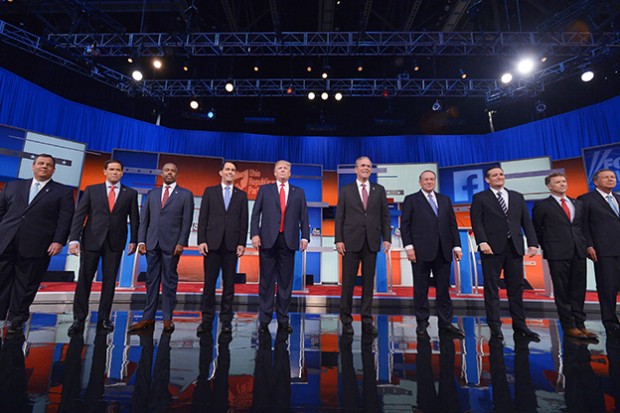Academic Standards Highlighted Briefly in GOP Debate
School is just starting in many districts in Indiana and across the country – and it looks like many of the candidates for president are coming back from their own “summer break” of thinking about school, too.
The top ten Republican presidential contenders took to the stage in Cleveland Thursday night, introducing themselves to the nation in the first of many televised debates, hosted by Fox News.
Education was noticeably absent from much of the discussion – instead, topics including illegal immigration, national security and social issues took center stage.

The top ten Republican candidates for president, as determined by national polling data, took part in a televised debate hosted by Fox News Thursday night. (Photo Credit: scrolleditorial/Flickr)
But a question tossed to former Florida Governor Jeb Bush – the candidate with arguably the longest education résumé – at least started the conversation. A moderator asked Bush to address his stance on the Common Core State Standards, a system the politician has backed despite criticism from many of his opponents.
“I don’t believe the federal government should be involved with the creation of standards directly or indirectly, or the creation of curriculum or content,” Bush answered. “I’m for higher standards measured in an intellectually honest way with abundant school choice.”
Bush engaged his opponent and fellow Floridian, Sen. Marco Rubio, on the topic. Rubio pointed out he believes the federal government should stay out of standards decisions.
“We do need curriculum reform and it should happen in the state and local level. That’s where education policy belongs,” Rubio said. “The Department of Education, like every federal agency, will never be satisfied. They will not stop with it being a suggestion, they will turn it into a mandate.”
In a fact-check of Rubio’s statement, Lauren Camera of Education Week’s Politics K-12 blog clarified that Common Core has never been federally mandated:
In reality, the Education Department never required states to adopt the common core. But Duncan and company encouraged adoption of the standards through the Race to the Top competition and later, waivers from the No Child Left Behind Act.
Bush agreed that states ought to create their own standards, noting that he is fine if some decide to opt out of Common Core as long as they keep their standards high.
“Today in America…30 percent [of our kids] are college and or career ready,” Bush said. “If we are going to compete in this world we are in today, there is no possible way we can do it with lowering expectations and dummying down everything.”
This position sounds very similar to that taken by Indiana Gov. Mike Pence, who has spoken about his ideas for college and career readiness on both the state and national levels. But unlike Bush, Pence is not a fan of Common Core as a means to the end – he led Indiana to become the first state to repeal the standards back in 2014.
Is Thursday night’s limited nod to school-related issues a preview of what’s to come in further discussions about education?
Experts predict we’ll hear more about higher education, specifically student debt. Conversation on that subject could begin next week, when Democratic frontrunner Hillary Clinton is expected to roll out her plan for student loan reform. POLITICO‘s Annie Karni says these proposals are expected to be “the most detailed and costly plank of her campaign”:
As part of her plan, Clinton is expected to unveil a federal-state partnership to increase funding for public colleges and universities, several sources said. The proposal is expected to create an incentive system for states to increase their investments in higher education — a commitment to increasing public college funding would trigger further investment from the federal government, reducing tuition overall and, more specifically, the portion financed by the student.
Other subjects candidates could likely cover over the course of the primary season include standardized testing and the No Child Left Behind rewrite.